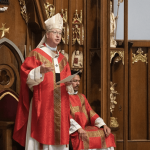VANCOUVER (CCN) — “Depression, anxiety, trauma, and other mental burdens—diagnosed or not—are not signs of moral failure or punishments from God.”
In a pastoral letter for World Mental Health Day on Oct. 10, Archbishop Richard Smith invited Catholics to look upon those who suffer in mind and spirit with the same tenderness Christ showed to the sick and sorrowful.
“Our Lord was a man of sorrows, acquainted with grief,” the Archbishop wrote. “He embraced our full humanity, sharing in our suffering and offering a love that can heal the deepest wounds of the heart.”
The Oct. 10 letter came as the Archdiocese of Vancouver prepares for its first-ever Green Mass for Mental Health, to be celebrated Oct. 24 at All Saints Church in Coquitlam. The Mass, open to all, will gather mental-health professionals, people with lived experience, their families, and supporters for prayer and solidarity. A small reception will follow.
Archbishop Smith said the Church must speak openly about mental health to break the silence that isolates those who are suffering. “Too many people suffer alone, fearing judgment or misunderstanding,” he wrote. “We must speak openly and honestly about these struggles, reassuring each other that there is no shame in seeking help.”
In a message to priests and deacons, he urged clergy to help make parishes “places of refuge where suffering is met with compassion and vulnerability is met with tenderness.” Simple actions such as mentioning mental health in homilies, prayers, and pastoral conversations can, he said, bring light to what is often hidden in darkness.
The new Mental Health Ministry of the Archdiocese, launched this year, is aimed at strengthening that culture of compassion across parishes. Coordinated by Jane Waldock, the ministry was recently recognized by the Vatican for its witness of mercy and accompaniment.
In a Sept. 19 letter, Cardinal Michael Czerny, S.J., prefect of the Dicastery for Promoting Integral Human Development, called the initiative “an important and powerful sign of hope and consolation” at a time when many face anxiety and depression in silence. Quoting Fratelli Tutti, he wrote that “service means caring for vulnerability” and praised Vancouver’s ministry for drawing near “with tenderness to those who live in fragility and isolation.”
Waldock said the upcoming Green Mass will be both a prayer for healing and a public expression of care for all who struggle. “It’s a way to say to people: you are not alone, and the Church sees you,” she said.
That message is echoed by two Catholic counsellors working in the archdiocese. Sister John Mary Sullivan said the Church’s vision of the human person unites physical, emotional, and spiritual wellbeing. “As we struggle with things like depression and anxiety, they don’t have to inhibit spiritual growth but can be a means of it,” she said.
Marriage and family therapist Trish McManus added that emotions are “not a flaw in God’s design but purposeful in our humanity.” Understanding and integrating them, she said, helps people make “fully human choices that acknowledge our emotions rather than being ruled by them.”
Both counsellors point to resources such as The Sanctuary Course, a free eight-session series that helps faith communities begin conversations about mental health.
Archbishop Smith closed his letter with reassurance for those carrying heavy burdens: “You are not alone. The Lord walks with you and the Church stands beside you. There is hope. There is healing. There is enough grace for every sorrow.”




